Origins of public theatre
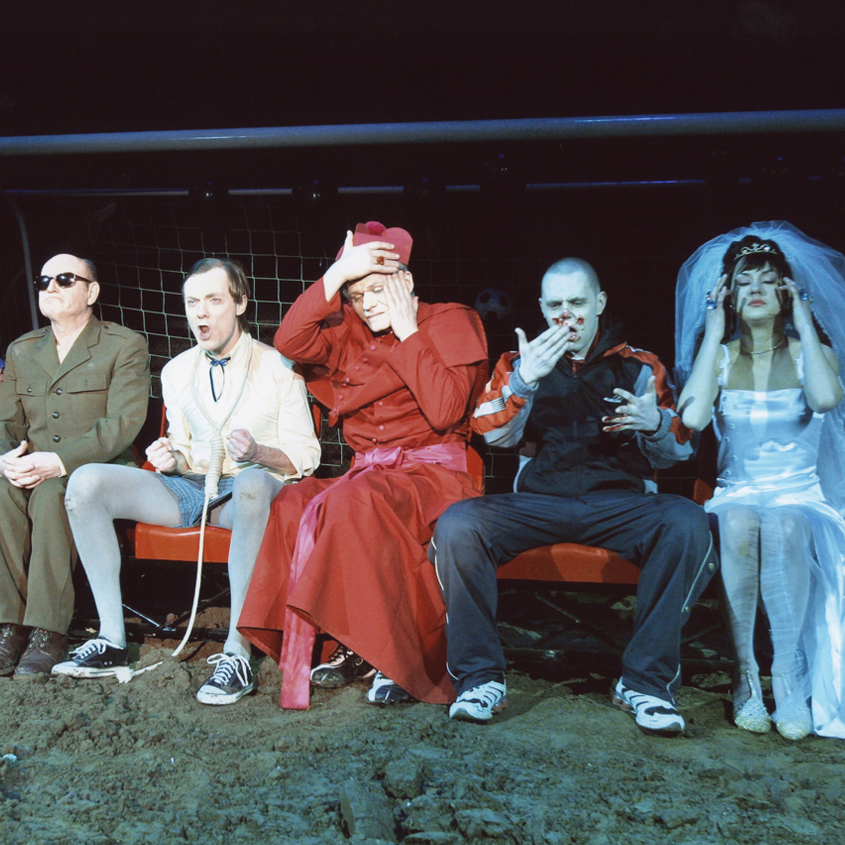
A terrible scandal erupted. The performance was banned, and its author had to write another play in which everything was the other way around. In order not to offend anyone, and to make amends to the already offended ones. The thing was in fact trivial, the issue was who would get the hand of a noblewoman – a Pole or a foreigner. But it turned out, perhaps contrary to the expectations of all, that the performance began to resonate and caused a stir.
‘The Polish nation and in particular the gentry is treated in a manner unheard of, and its customs are boorishly rebuked’, a spy reported, as back then foreign secret service agents were diligently following what was happening in the Warsaw theatre. It was in a way a founders’ s scandal. As many as ten years later the author, taking the chance that the play was published, excused himself: ‘After the first staging of that Comedy, various opinions about it were to be heard. Some declared their liking, others were angry with it for the very reason that it seemed to be willing to harm the honour of our nation.’ And he explained that offending the nation was not his intention.
Marriage by the Calendar [Małżeństwo z kalendarza], as what is meant is this 1766 text by Fransiszek Bohomolec, so friendly from today’s perspective, was the second premiere of the public theatre. And at the same time it was actually the last one that evoked such emotions – later the defensive was only getting deeper.
We are reminded of the scandal around this performance when during an amateur recording of To Damascus [Do Damaszku] in the Old Theatre cries are heard that ‘this is not the National Theatre’. Emotions are there, it is a matter of national offence, even the rhetoric is similar.
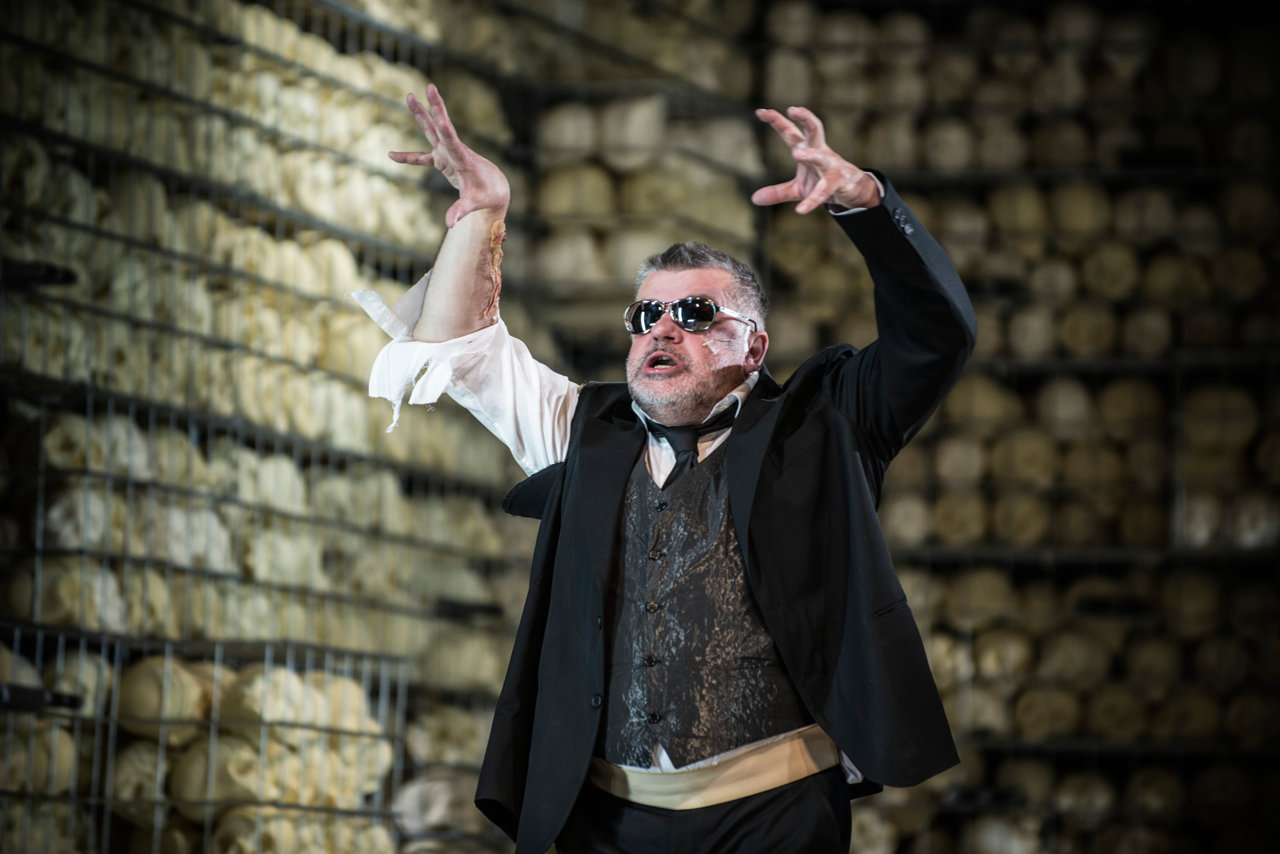 To Damascus [Do Damaszku], dir. Jan Klata, photo by Magda Hueckel
To Damascus [Do Damaszku], dir. Jan Klata, photo by Magda Hueckel
One may smile nowadays reading the statement by Julia Pitera and Paweł Opaliński (back then councillors of the Solidarity Electoral Action AWS), who wrote after the opening night of Shopping and Fucking directed by Paweł Łysak and performed in the Warsaw Variety Theatre (1999): ‘It is with disapproval that we reflect upon crossing the borders of creative freedom which in the interpretation of the capital Variety Theatre consists in cesspit realism: with dramatic scenes of homosexual rapes, obscene vocabulary and humiliating behaviours. The performance forms a part of [...]actions that are to familiarize us with deviations, as can be seen on billboards, in the press and TV.’ Please, bear in mind what is sounds like today, after fifteen years.
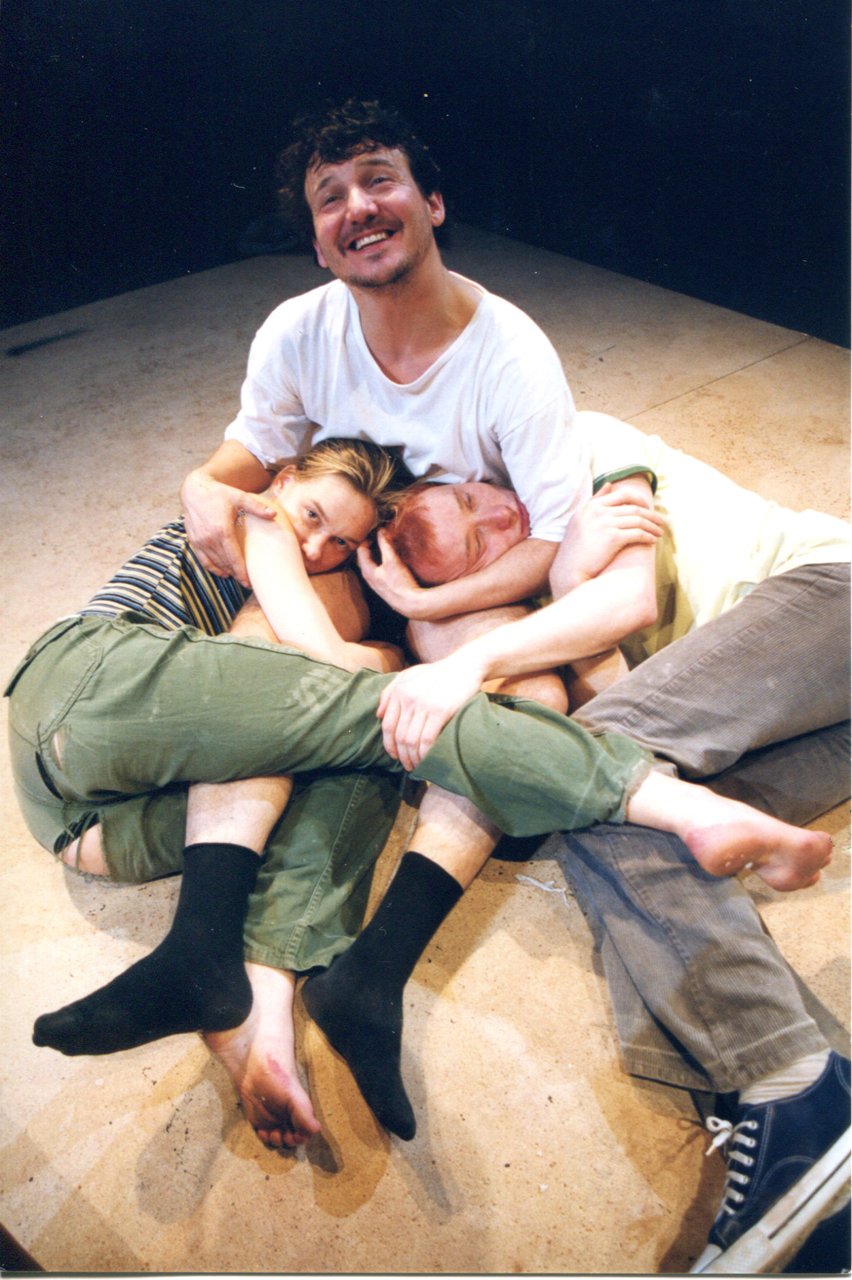 Shopping and Fucking, dir. Paweł Łysak, photo by Jacek Barcz
Shopping and Fucking, dir. Paweł Łysak, photo by Jacek Barcz
What comes to mind is once again Heine and his memo after the premiere of the Intruders: ‘Polish comedies mostly present love intrigues, so accurately re-acted by movements and words that only mattresses are missing. Young girls learn there what they had not experienced yet.’ The whole matter is spiced up by the fact that neither Pitera, nor Heine saw the performances they were talking about: the councillor was informed about the scandal by her son, ‘an intelligent, well-read and well-travelled person, who was brought up in a family with no prudishness’; Heine knew the story from gossips.
If one reads more closely the parliamentary questions raised after the failed staging of Golgota Picnic, where, like in the interpellation of Maciej Łopiński, the following questions are posed: ‘1. Why was the performance Golgota Picnic put in the program of this year’s festival? 2. Why does the ministry co-finance a project that offends religious feelings of Poles? 3. Why did the ministry, despite knowing that the performance awakes numerous controversies worldwide, not oppose to putting it in the program of the festival?’, then naturally we are reminded of the speech made by deputy Jan Suchorzewski at the seym of 1791, who, being offended with the staging of The Return of the Deputy [Powrót posła], demanded that the monopoly be taken away from Bogusławski and accused the author and the police that ‘they committed a disgraceful performance’. He asked how one could offend Poles by presenting a performance that questioned free elections. And do that for public money, in a theatre which, according to Suchorzewski, was the most expensive one in Europe. And instead of The Return of the Deputy, on the Warsaw stage he would gladly see The Spartan Mother [Matka Spartanka] by Kniaźnin, performed in Puławy, that tells a story about defending homeland, and its central character is the Polish Mother dressed in ancient robes.
A strange frame connecting our contemporary times with the theatre of Poniatowski or Bogusławski is created. It turns out that the present rows about theatre strangely resemble those from over two hundred years ago. Poniatowski thus becomes now our ally in the struggle against benightedness and superstition. Public theatre – ours and the one from a quarter-millennium ago – becomes the arena of civilizational dispute.
In the eighteenth-century reality, we are thus looking for allies in matters which are pretty contemporary in nature. In contemporary theatre, we find echoes of disputes from almost two hundred and fifty years ago. And even more strongly: the alliance of today’s public theatre with the eighteenth century one is about finding traces of contemporary disputes in the past. In other words, we are looking for a patron for today’s theatre. We are looking for an ally for contemporary theatre of disputes and debate. And we successfully find one.
But it has not always been the case. Fifty years ago, when celebrating the two-hundredth anniversary of the Intruders, people were speaking of the National Theatre. That fundamentally changed the shape of the discussion around the anniversary. What was meant was a theatre that should be the guardian of purity and beauty of the Polish language, nurse the canon – in particular the romantic one – and national tradition.
On that occasion, the correspondence of Heine with prince Francis Xavier, Saxon regent, was published under the title The National Theatre 1765-1766. Espionage Reports [Teatr Narodowy 1765-1766. Raporty szpiega]. To the fragment about mattresses and corruption of young girls a note was added: ‘The text is not licentious. Apparently that was the impression that the audience got as a result of the author’s directing.’ Breaking social taboos and introducing moral changes, however, was unbecoming in the National. What was at stake was rather petrifaction of the canon than a debate. As can be seen, even Poniatowski could be the patron here. Yet by some weird coincidence only Zabłocki (The Dandy’s Courtship [Fircyk w zalotach] and The King of Cockaigne [Król w kraju rozkoszy]) and Bogusławski (Krakovians and Highlanders [Krakowiacy i Górale]) found their place in the proposed repertoire. Pretty modest as for the founding fathers.
But it is not the Poniatowski’s theatre that changed. Our expectations towards it are different because our theatre changed. What changed is the place from which we look at what was happening two hundred and fifty years ago. In contemporary democracy, as that is what really matters, discussions in public agora are more important than locking oneself in national tradition, irrespective of how it is understood. The sense of democracy lies in public theatre. Theatre reacted and still reacts quickly to changes.
In 1990, Mikołaj Grabowski performed the Description of Customs [Opis obyczajów] based on Kitowicz in the STU Theatre, necessarily returning to the discussions held on the Enlightenment stage. Topics that were very much alive two hundred and fifty years ago have been returning since more or less that time. The last quarter of the century can look at itself in the mirror of the three decades between 1765 and 1795.
Theatre icons of the last twenty-five years were not the Forefathers’ Eve [Dziady], nor any Kordian, but the Story... [Historyja…] by Piotr Cieplak (1994) with Christ in jeans trousers, Hamlet (1999) and Cleansed [Oczyszczeni] (2002) by Krzysztof Warlikowski, or the Trilogy [Trylogia] by Jan Klata (2009). Recently, the romantic repertoire seems to be coming back, but strangely changed: after Michał Zadara’s or – even more so – Radosław Rychcik’s Forefathers’ Eve [Dziady], and in particular after The Towianists [Towańczycy] by Jolanta Janiczak and Wiktor Rubin, or The Un-Divine Comedy[nie-boska komedia] by Paweł Demirski and Monika Strzępka, it will be difficult to talk about the romantic tradition in the old way; we will rather be arguing with tradition than letting it rule us. And perhaps this makes us more like the enlightened ones.
Perhaps it is so that the language of the Enlightenment is closer to us than the romantic one. The Enlightenment preferred comedies. Laugh, as was thought back then, was supposed to be a proof of rational thinking: in order to laugh at a joke, one needed to understand it first. Maybe nowadays laughter is also most subversive; mockery and jeer, and not even irony, are the language with the greatest explosive power.
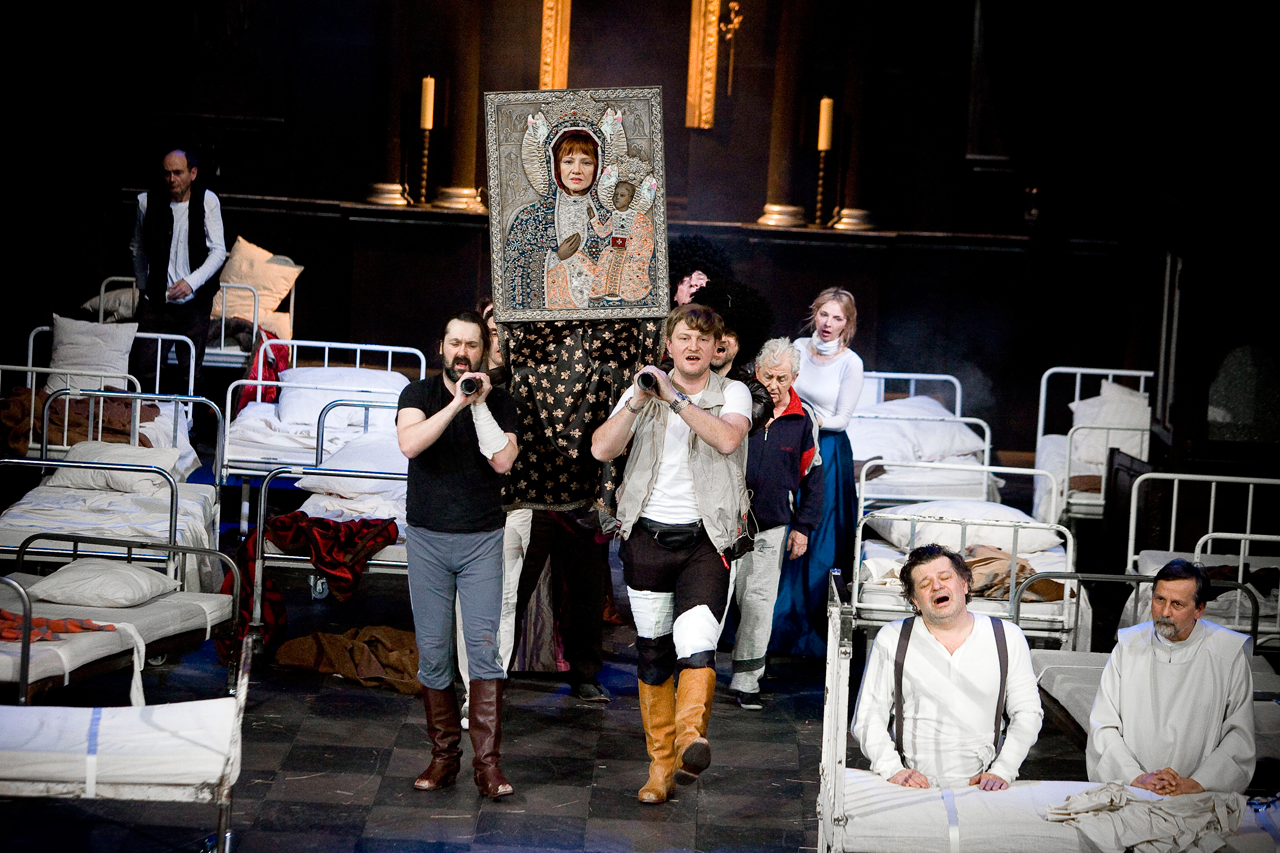 Trilogy [Trylogia], dir. Jan Klata, photo by Bartłomiej Sowa
Trilogy [Trylogia], dir. Jan Klata, photo by Bartłomiej Sowa
From that perspective, the performance There were POLE, POLE, POLE and a Devil by Monika Strzępka from 2007 is in some sense an Enlightenment comedy: politically engaged, with a clear thesis, clearly cut-out types of people and mercilessly mocking everybody. Her subsequent performances could also be set in the Enlightenment tradition. Thus perhaps in terms of genre preferences we are like the enlightened.
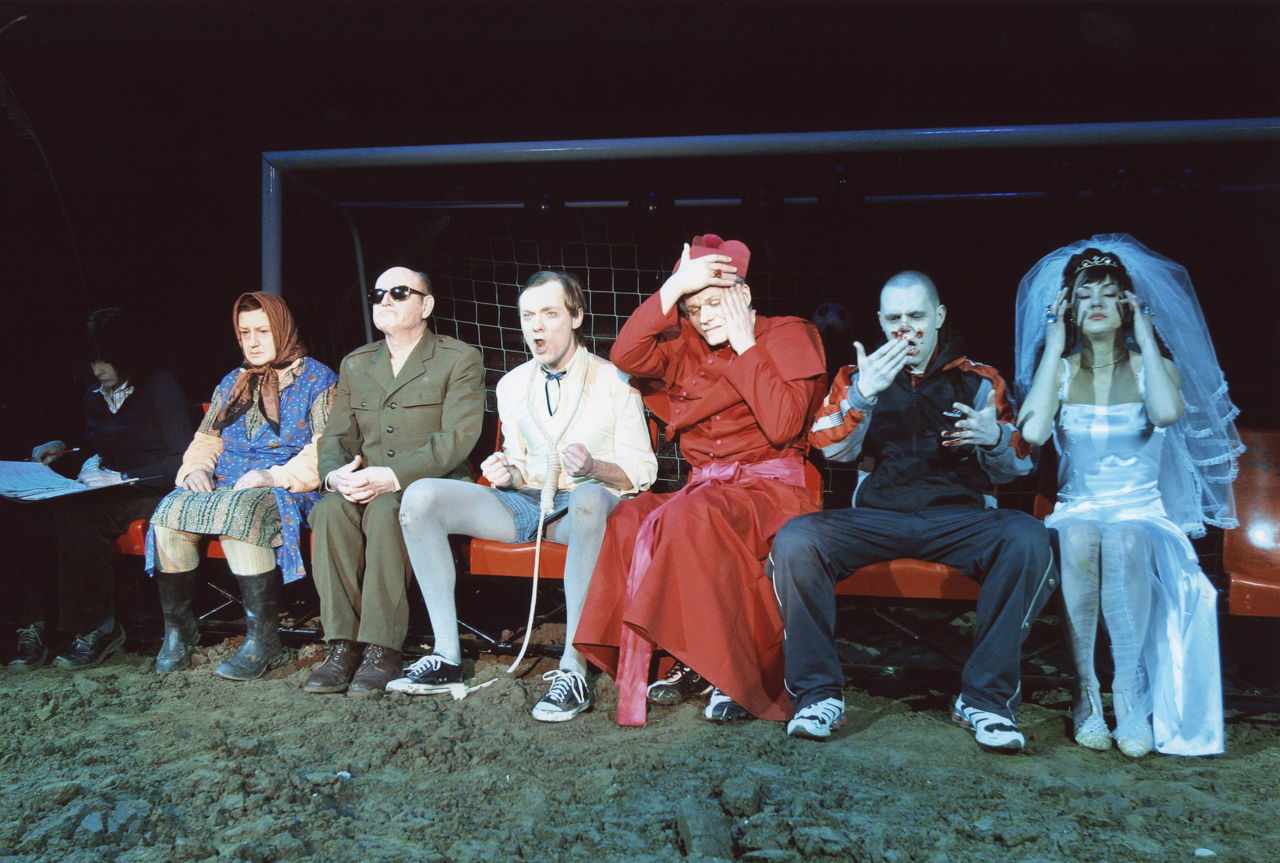 There were POLE, POLE, POLE and a Devil [Był sobie POLAK POLAK POLAK i diabeł], dir. Monika Strzępka, photo by Bartłomiej Sowa
There were POLE, POLE, POLE and a Devil [Był sobie POLAK POLAK POLAK i diabeł], dir. Monika Strzępka, photo by Bartłomiej Sowa
It is obviously fun. The point is not about proving the thesis that today’s theatre is the line of succession to the Enlightenment. It is not – quite on the contrary. Yes, yes – just like that. Similarities are probably also not purely coincidental; however, they result from our dreams about public theatre. In the past we look for what is close to us today: ideological and moral conflicts, breaking taboos, involvement of theatre in politics, and finally perception of it as a tool for social change.
Today, the notion of “public theatre” has greater potential. We speak of public opinion, public sphere, public institutions, public finance, public media as inalienable elements of life in democracy. And in fact, if we look at the theatre established by Poniatowski from that perspective, it becomes part of the public sphere, one of the most important media, next to the “Monitor”, which shape public opinion.
The key here is the word “public” and in fact unlike “national” it appears already in the first press coverage about the premiere of the Intruders [Natręci]. Back then Franciszek Bohomolec’s “Wiadomości Warszawskie” [“Warsaw News”] wrote that on the day before, the first Polish comedy entitled Intruders had been presented in an ordinary public theatre. And yet public! Just that then the word “public” meant more or less “open”.
Today’s notion of “public theatre” is an interception. Not a hostile takeover but a lexical interception of a word and granting it contemporary sense. Broadening the theatre’s scope of activity.
And that is what it is all about. That is what the 250th anniversary of Polish public theatre is devoted to. In fact it is about today’s theatre and today’s understanding of the word “public”, constitutitive for democracy.
It is not about the past, but about the presence which shapes our images concerning public theatre and our expectations towards it. Therefore, nowadays we should rather look for the roots of public theatre not in the theatre established by the king in the Saxon Opera House (Operalnia Saska). The origin of public theatre is an establishing gesture – a pretty contemporary one; a gesture that can be the act of the parliament providing funds for the Year of Polish Theatre, or a new book, exhibition, performance. In general, one should look for sources of theatre rather in contemporary intentions than in a faraway past.
Piotr Morawski